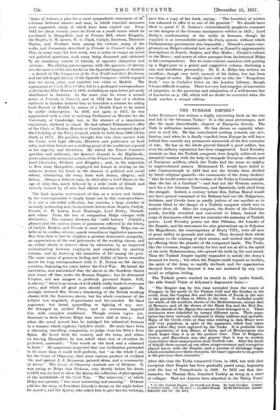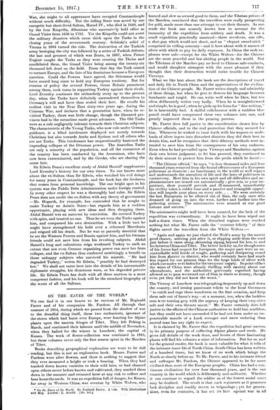THE TURKISH EMPIRE.*
Loan EvEnstny has written a highly interesting book on the rise and fall of the Ottoman Turks.' It is the most picturesque, and also the most discreditable, chapter of European history. The Turk is militarism incarnate. He has shown no capacity what- ever in civil life. He has contributed nothing towards our civi- lization, and when he is finally expelled from Europe he will leave behind him scarcely any permanent memorials of his five centuries of rule. He has on the whole proved himself a good soldier, but even his military reputation has been exaggerated. Lord Eversley reminds us that the Turkish conquests were largely achieved over disunited enemies with the help of renegade European officers and of European artillery, which the Turks had the sense to entploy in unprecedented masses. Mohammed II, would have failed to take Constantinople in 1453 had not the Greeks been divided by bitter religious quarrels—the commander of the Army declaree "that he would rather see the turban of the Turks in Constantinople than the hat of a Cardinal "—and had not the Western nations, save for a few Genoese, Venetians, and Spaniards, held aloof from the struggle. Indeed, a century before this, Sultan Murad would not have gained command of the Balkans had not the Bulgarians, Serbians, and Greeks been so madly jealous of one another as to become blind to the danger of a Turkish conquest which was to enslave them all. After the conquest, the flower of the Christian youth, forcibly recruited and converted to Islam, formed the corps of Janissaries which seas for centuries the mainstay of Turkish power. Lord Eversley points out that Othman, the founder of the Empire, and his successors for nine generations up to Solyman the Magnificent, the contemporary of Henry VJII.. wore all men of great ability as 'generals and rulers. They devoted their whole attention to the training of their armies, and excited their troops by offering them the plunder of the conquered lands. The Turks. like the Germans, fought mainly for loot and not at all in the spirit of the early Mohammedans, who spread the faith by fire and sword. Thus the Turkish Empire rapidly expanded to :satisfy the Army's demand for booty ; but when the Empire could expand no further, the spirit of the Army as rapidly declined, and the organization decayed from within because it was not animated by any truo racial or religious feeling.
:rho Turkish power reached its zenith in 1578, under Sokolli, the able Grand Vizier of Solyman's degenerate heirs:—
" The Empire was by this time extended from the centre of Hungary in the north to the Persian Gulf and the Soudan in the south, from the Caspian Sea and the borders of Persia in the east to the province of Oran in Africa in the west. It included nearly the whole of the southern shores of the Mediterranean, except that of Morocco, and all the shores of the Black Sea and the Rod Sea. All the islands of the /Evan Sea except Crete belonged to it. These territories were inhabited by twenty different races. Their popu- lation has been variously estimated at thirty millions and upwards. Many of the Greek cities at that time existing in Asia Minor were still very populous, in spite of the massacres which had taken place when they were captured by the Turks. It is probable that the population of Asia Minor, of Syria, and of Mesopotamia was much larger than it. is at the present time. That of Bulgaria, Greece, and Macedonia was also greater than it was in modem times before their emancipation from Turkish rule. After the death of Sokolli there ensued an era when misgovernment and corruption played havoc with the Empire, and a process of shrinkage began which extended over three centuries, the exact opposite to its growth in the previous three centuries,"
After this time the Turks conquered Crete, in 1688, but with that exception their Empire has been gradually pared away, beginning with the loss of Transylvania in 1606. In 1622 our first Am- bassador, Sir Thomas Roe, described Turkey as being in a state of collapse. Had not Austria been absorbed in the Thirty Years'
• (1) The Turkish Empirs its West! asa T. Fiehsr Unnin. Des ed. ItPt I Dwas- By Lard Ermley. London,
(Mutable sod Co. Lee. net.] • —(-)414""14."4. By Sk Ethri'r"r"*".M:
War, she might to all appearance have occupied Constantinople without much difficulty. But the falling State was saved by one energetic but short-lived Sultan, Mumd IV., who died in 1640, and by the four Kit/1,611s, Albanians who successively held office as Grand Vizier from 1656 to 1702. Yet the Kiuprilis could not avert the military disasters which came thick upon the Turks in the closing years of the seventeenth century. Sobfeeki's relief of Vienna in 1083 turned the tide. The destruction of the Turkish army besieging the city was followed by a series of Turkish defeats, the last and greatest of which was Zenta, in 1697, when Prince Eugene caught the Turks as they were crossing the Theiss and annihilated them. the Grand Vizier being among the twenty-six thousand left dead on the field. From that day the Turk ceased to menace Europe, and the fate of his dominions became a European question. Could the Powers have agreed, the Ottomans would have ceaeed long since to hold any European territory. But for reasons of policy the several Powers, Great Britain prominent among them, took turns in supporting Turkey against their rivals. Lord Eversley continues the melancholy story up to the present day, when the Turks have definitely surrendered themselves to Germany's will and have thus sealed their fete. He recalls his earliest visit to the Near East sixty-two years ago, during the Crimean War, and declares that a generation later, when he re- visited Turkey, there was little change, though the liberated pro- vinces had in the meantime made great advances. The Old Turks were as a rule negligently tolerant towards their Christian subjects. The characteristic of tile Young Turks, who now rule under German guidance, is a blind intolerance displayed not merely towards Christians but also towards Arabs and Syrians and all others who are not Turks. This intolerance has unquestionably hastened the impending collapse of the Ottoman power. The Anatolian Turks are only a minority of the population, and all the commerce of the country has been conducted by the Armenians, who have now been exterminated, and by the Greeks, who are sharing the same fate.
Sir Edwin Pears's excellent study of Abdul Hamid. supplements Lord Eversley's history for our own times. No one knows more about the ex-Sultan than Sir Edwin, who watched his evil doings for many years in Constantinople, and the book has the freshness that comes from personal knowledge. The one bright spot in his system was the Public Debt Administration under foreign control. In every othor respect he was a thoroughly bad ruler. Sir Edwin Pears does not credit the ex.Sultan with any theory of government —Mr. Hogarth, for example, has contended that he sought to make Turkey an Asiatic State—but regards him as a reckless opportunist, playing wills new ideas and then dropping them. Abdul Hassid was an autocrat by conviction. He covered Turkey with spies, and trusted no one. Thus he set even the Turks against him, and compassed his own destruction. With a little tact he might have strengthened his hold over a reformed Macedonia and reigned till his death. But he was so patently deceitful that he set the Western Powers and Russia against him, and his German friends could not save him from his revolting subjects. Abdul Hamid's long and calamitous reign weakened Turkey to such an extent that not even German organizing power can save her from collapse, and the ex-Sultan thus conferred unwittingly a benefit on those unhappy subjects who survived his misrule. " He had degraded Turkey," writes Sir Edwin, "possibly he had destroyed her." We shall not enter here into the details of his interminable diplomatic struggles, his disesteems wars, or his degraded private life. Sir Edwin Pears has dealt with all those matters in a most competent fashion, and his book will be the standard biography of the worst of all the Sultans.



































 Previous page
Previous page